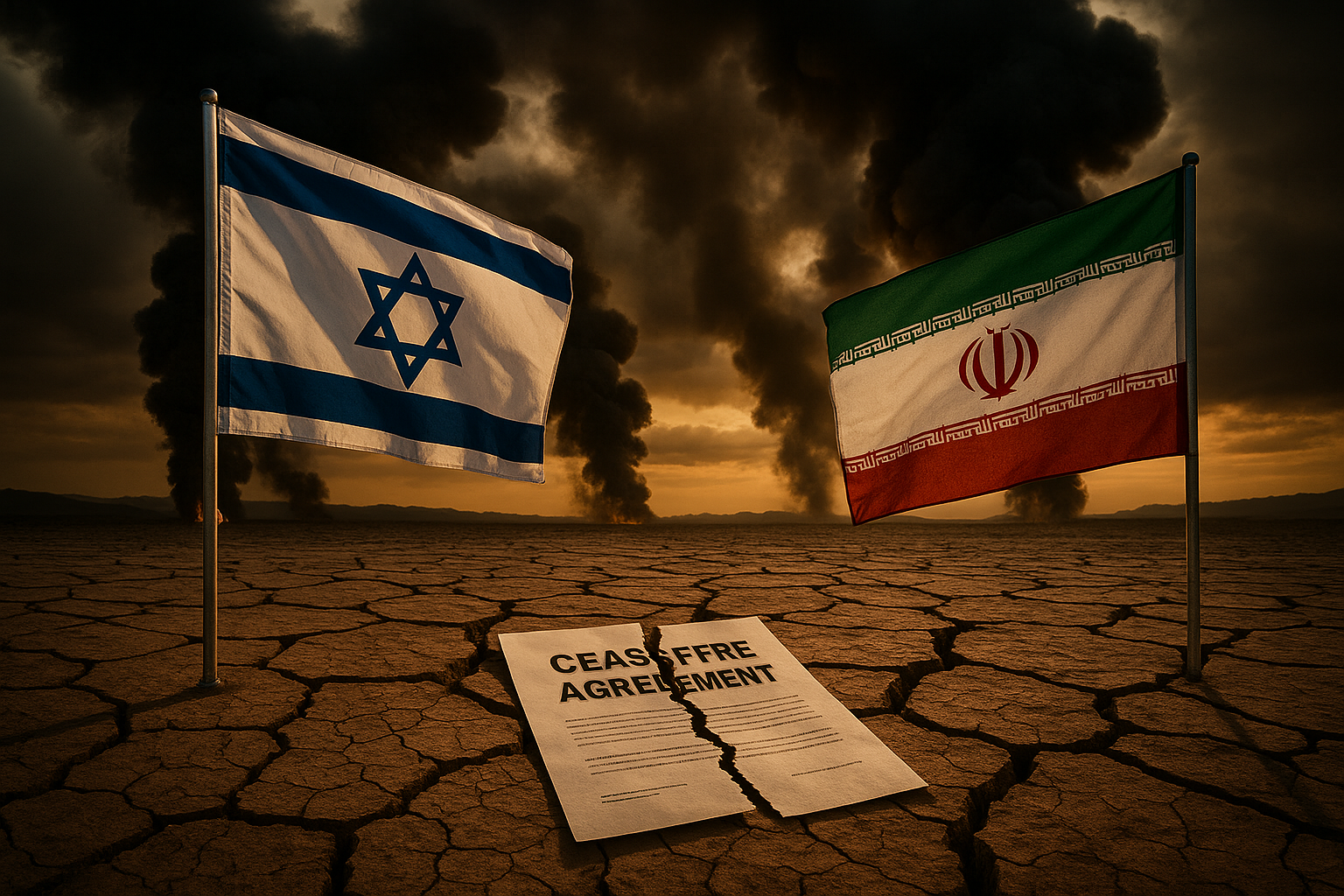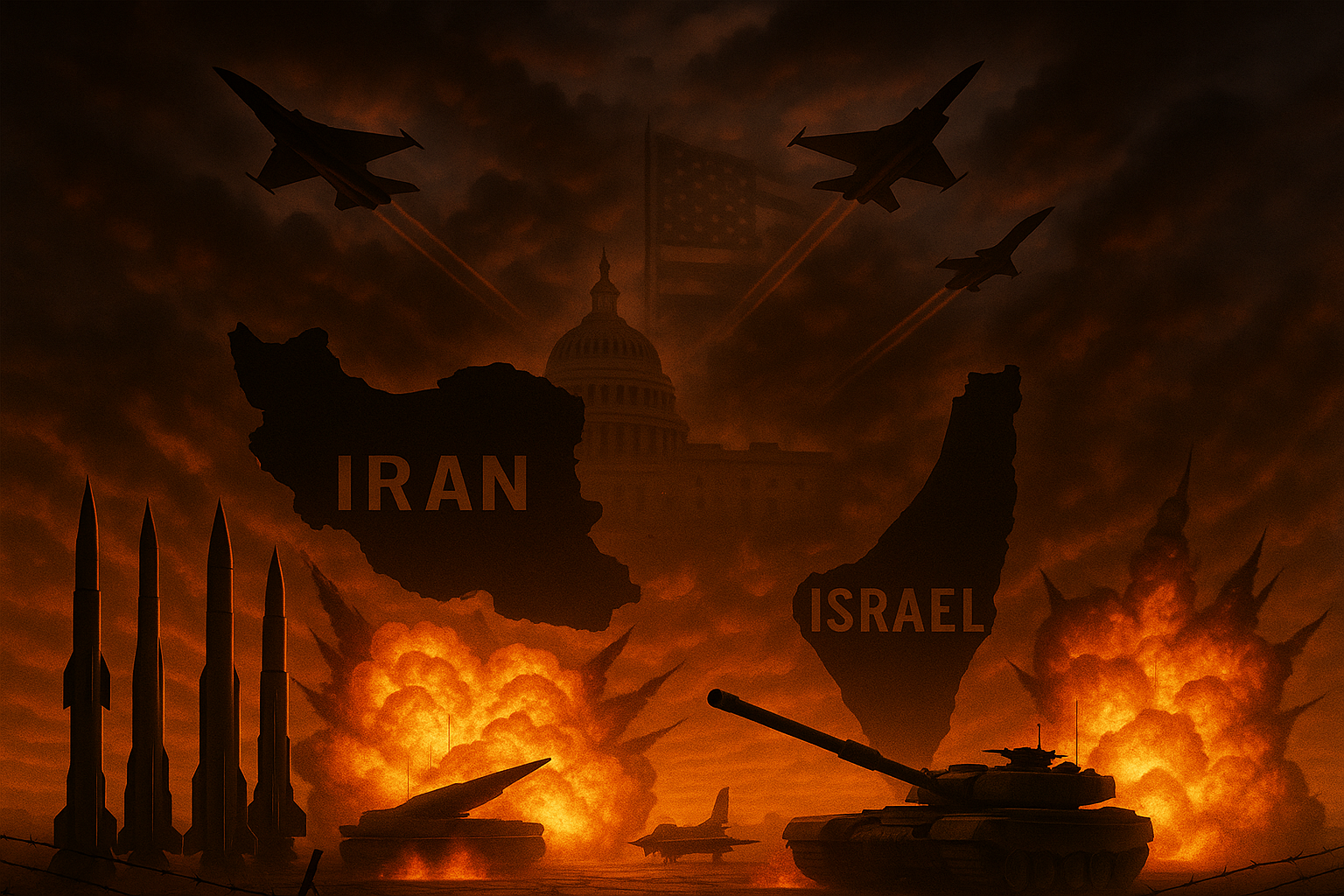Israel–Iran Ceasefire: Another Deception or a Genuine Step Toward Peace?

The conflict between Iran and Israel is deeply rooted in decades of political hostility, religious ideology, and strategic rivalry. Their antagonism is no secret to the world, as both nations have consistently found themselves on opposing sides of regional issues. This article explores the historical evolution of Iran-Israel relations, tracing it from Cold War alignments to present-day proxy warfare. Tensions escalated sharply following the Hamas-led attack on Israel, triggering a massive Israeli military response. In the aftermath, Iran and its regional allies, particularly in Gaza, rallied behind Palestinian factions, providing both moral and material support. What followed was a dangerous chain of events: Israel launched a strategic strike targeting Iranian nuclear infrastructure, a move that dramatically raised regional alarm. In a rare and high-stakes show of alignment, the United States supported Israel by deploying a B-2 bomber to carry out an attack on Iranian assets. Now, amidst mounting international pressure and economic fatigue on all sides, a sudden announcement of a ceasefire has taken the global stage by surprise. The pressing question remains: is this ceasefire a sincere attempt at peace or merely a strategic pause in a long-standing shadow war?
A critical lens must be applied when assessing the recent ceasefire between Iran and Israel — particularly from Iran's perspective. Can Iran genuinely trust a nation like Israel, which has repeatedly been accused of violating ceasefire agreements, especially during the ongoing Gaza conflict? Historical precedents paint a skeptical picture. During past ceasefire announcements in the Gaza war, Israeli forces have continued operations under the guise of “self-defense” or “security maintenance,” effectively undermining the spirit of truce. Numerous reports by international observers and humanitarian organizations have cited Israeli airstrikes and ground raids even after ceasefires were officially declared. These violations have eroded trust not only with Palestinian groups but also with regional powers like Iran that back them. Adding another layer of uncertainty is the role of the United States, whose current president has shown a pattern of inconsistency in foreign policy. Known for abrupt decisions and sudden reversals — sometimes within days — the U.S. leadership under his command has often confused allies and adversaries alike. Whether it was rapid troop withdrawals, shifting stances on NATO, or contradictory statements on Middle East diplomacy, this unpredictability makes any American-brokered peace feel inherently unstable to Iran and its allies. Given this backdrop, Iran’s decision to consider or even temporarily honor a ceasefire raises a fundamental question: is this a reluctant concession, a strategic pause, or a carefully calculated maneuver amidst a broader game of regional survival?
At the heart of recent events lies a critical question: what exactly pushed Israel to launch a direct attack on Iran? Was it truly an effort to prevent Iran from developing a nuclear weapon — or was it actually retaliation for Iran’s involvement in the Gaza war? If Israel’s primary aim was only to stop Iran’s nuclear ambitions, this action seems oddly timed. For years, Israel has had strong intelligence capabilities monitoring Iran’s nuclear program. If the threat was urgent, Israel could have — and likely would have — acted long ago. The fact that Israel waited until after the Gaza conflict escalated, and after Iran publicly showed support for Hamas and Palestinian factions, suggests the strike was more about retribution than prevention. Israel has long accused Iran of backing militant groups in Gaza, including Hamas, Houthis and Hezbollah. These groups were central to the attacks on Israel that reignited this phase of the war. In this context, Iran was seen as more than just a distant threat — it became a direct party in the conflict, pushing Israel to respond beyond Gaza and strike at the source. If this was indeed a reaction to Iran’s role in Gaza, it may only be the beginning. Israel’s Prime Minister has hinted at future operations and has historically shown willingness to eliminate not just militant groups but their top leaders as well. The pattern is consistent with past Israeli actions — targeted killings, strategic strikes, and a broader effort to break the networks that pose a threat. But there may be a deeper motive behind this latest strike. Many observers believe Israel now sees a much bigger picture: that as long as Iran’s current regime remains in power — especially under its Supreme Leader — no external pressure, no sanctions, and no military threat will permanently stop Iran from enriching uranium and pursuing nuclear capabilities. In other words, Israel may have concluded that regime change or leadership elimination is the only long-term solution. This suggests that Israel’s strike was not just about nuclear weapons or punishment for supporting Gaza-based groups. It was a strategic signal — a declaration that the real objective is to dismantle Iran’s ability to pose such threats in the future. The focus has shifted from short-term deterrence to long-term transformation.

Now that the dust has settled — at least temporarily — it’s essential to examine what Israel truly accomplished with its high-stakes attack on Iran. Did the operation succeed in completely dismantling Iran’s nuclear ambitions? Or was the impact more symbolic than strategic? At first glance, Israel’s goal may seem straightforward: prevent Iran from becoming a nuclear-armed state. But despite the scale and coordination of the recent strike — which also included U.S. B-2 bombers dropping bunker-busting munitions — the outcome does not appear to be as decisive as some may have expected. There have been no confirmed reports of uranium leakage, radioactive contamination, or any other clear signs of catastrophic damage to Iran’s nuclear infrastructure. This raises an important possibility: Iran may have already moved its most critical nuclear materials and equipment to more secure, undisclosed locations. In fact, many analysts believe Iran had anticipated this kind of attack and took steps well in advance to safeguard its core assets. Deep underground bunkers, mobile facilities, and hidden research labs are all part of Iran’s longstanding strategy to survive even the most advanced airstrikes. So, while the physical damage to nuclear facilities may have been limited, that doesn’t mean the attack was without consequence. One of the most significant impacts was the assassination of more than 13 key Iranian nuclear scientists — individuals who were believed to be instrumental in designing and managing various phases of Iran’s enrichment and weapons-development programs. Alongside them, several top-ranking military generals from the Iranian Revolutionary Guard were also reported killed. This loss of human capital — decades of technical knowledge, strategic experience, and operational leadership — may not completely stop Iran’s nuclear program, but it will undoubtedly slow it down. So, in essence, Israel did not “destroy” Iran’s nuclear capability — but it likely delayed it. How long that delay will last remains unclear. Months? A year? Perhaps more? That will depend on how quickly Iran can reorganize, recruit, and reestablish its technical momentum. Meanwhile, the United States now finds itself in a difficult position. By participating directly in the attack — especially through the use of B-2 bombers — the U.S. has attracted widespread criticism from the international community. Many countries see this move as unnecessary aggression, escalating an already fragile situation in the region. With tensions running high, American diplomacy may suffer further, especially in negotiations with neutral nations or those aligned with Iran. In short, while Israel’s attack sent a clear message and inflicted real operational damage — especially through targeted assassinations — it did not eliminate the nuclear threat. What it did achieve was a tactical delay and a psychological blow to Iran’s scientific and military leadership. But in doing so, it may have also pushed the region closer to prolonged instability and drawn the United States into deeper scrutiny on the global stage.

The Middle East and surrounding regions are home to a majority of the world's Muslim population — with over 57 Muslim-majority countries, including wealthy oil giants like those in OPEC and even a nuclear-armed nation like Pakistan. Yet, despite the common religious and cultural connection to the Palestinian cause, most of these countries remain silent or diplomatically passive when it comes to challenging Israel or its most powerful backer — the United States. One would expect unity in the face of the humanitarian catastrophe unfolding in Gaza. But instead of solidarity, what we often witness is political posturing, double standards, and silence. While some Muslim citizens across different nations have expressed strong support for Iran’s stance against Israel, their governments are choosing a very different path — one that leans toward appeasement of American power. Take, for instance, Qatar — a country that has positioned itself as a mediator in many regional conflicts. In recent days, it reportedly gifted a luxury private aircraft to the U.S. President. This move raised eyebrows across the Muslim world, especially among people who see the United States as a key enabler of Israel’s military actions in Gaza. Many ordinary Muslims believe that without American financial aid, weapons, and political protection, Israel could not have inflicted such destruction or resisted international pressure. Rather than confronting the root of the crisis or standing firmly with the victims of war, many Arab and Muslim leaders seem more focused on maintaining favorable relations with Washington. This pattern of diplomacy — driven by fear, economic dependence, or strategic alignment — comes at the cost of moral clarity and regional unity. Now let’s turn to Pakistan, a country whose population has historically shown deep sympathy for the Palestinian people. Across Pakistani cities, demonstrations, fundraisers, and prayers for Gaza have become routine whenever violence escalates. Yet, in stark contrast to public sentiment, Pakistan’s leadership recently made headlines for nominating former U.S. President Donald Trump for the Nobel Peace Prize. This move was widely mocked and criticized, especially because Trump’s administration was one of the most openly pro-Israel in modern U.S. history, and his policies played a role in destabilizing peace efforts across the Middle East. The irony is painful: while ordinary Muslims in many countries voice outrage over the humanitarian crisis in Gaza, the leadership of those same nations remains unwilling to directly oppose the United States or take a firm stand in defense of Palestinian lives or Iranian sovereignty. The harsh truth is that, in the real world, except for the voices of common people, most Muslim-majority countries are not willing to challenge American dominance or support Iran’s resistance against Israel. Whether due to fear, diplomacy, or economic interests, their silence and inaction continue to disappoint millions who had hoped for unity in the face of injustice.
"“This ceasefire is not a peace treaty — it is a pause between storms. As long as Iran believes regime change is Israel’s hidden objective, and as long as Israel sees every Iranian ally as a future threat, there will be no lasting calm. And when silence comes from the Muslim world’s leadership, it only echoes louder in Gaza’s ruins.” — Dr. Rehan Masoud, Middle East Political Analyst"
The announced ceasefire between Israel and Iran may have temporarily cooled the flames of direct confrontation, but it is far from a lasting peace. The events leading up to this fragile truce reveal deep-rooted hostility, strategic calculations, and unresolved grievances that are unlikely to disappear with a single agreement. For Iran, the road ahead is one of both mourning and recalibration. The loss of top scientists and generals has dealt a significant blow to its nuclear program’s leadership, but not its core intent. Iran has shown again and again that its long-term strategies are built on endurance and adaptation. With widespread public support in parts of the Muslim world and regional allies still active in Gaza, Lebanon, and Syria, Iran will likely double down on its resistance narrative, even as it takes time to rebuild its internal capacity. Israel, on the other hand, seems to be playing a much longer game. The recent strike, while not enough to dismantle Iran’s nuclear infrastructure, has achieved several short-term goals: delaying Iran’s progress, delivering a message of dominance, and testing the boundaries of international tolerance. But Israel's leadership has made it clear — this is not the end. Their vision appears focused on deeper objectives, possibly even regime change in Tehran. As long as Iran remains defiant and active in regional proxy conflicts, Israel is unlikely to back down. The United States now finds itself in a tight corner. Its direct involvement in the bombing campaign against Iran has invited criticism from many parts of the world. With growing backlash from both adversaries and supposed allies in the Muslim world, Washington may soon face diplomatic isolation in some quarters — particularly if humanitarian crises in Gaza and beyond continue to worsen. The credibility of American mediation in any future peace process has taken a hit. Across the broader Muslim world, the disconnect between leadership and public sentiment will likely grow wider. People in countries like Pakistan, Turkey, Lebanon, and even parts of the Gulf have shown frustration with their governments' passive or contradictory roles. While leaders continue to align with American and Western interests, their citizens grow more vocal in support of Palestine, and in some cases, Iran. This internal pressure could lead to civil unrest, policy shifts, or deeper ideological divides in the coming years. Looking ahead, the region seems to be heading into a period of strategic uncertainty. Ceasefires can pause wars — but they rarely resolve the core issues behind them. The absence of trust, the imbalance of power, and the deep ideological divide between Iran and Israel are not addressed by a single truce. The possibility of renewed conflict — whether in the form of cyber warfare, assassinations, proxy attacks, or full-scale military engagement — remains high. Unless there is a fundamental change in how global and regional powers approach peace, the current ceasefire will likely serve as little more than a temporary pause before the next round of escalation. The Middle East, once again, finds itself on the edge — not of peace, but of the next unpredictable chapter in a long and painful conflict.
This ceasefire between Israel and Iran may appear on the surface to be a step toward stability, but in reality, it feels more like a tactical pause than a genuine breakthrough. Both nations remain deeply entrenched in their ideologies, strategic goals, and historic animosities. The events of recent weeks have not healed old wounds — they have reopened them with greater intensity. Israel’s aggressive strike, supported by the United States, has delivered a short-term disruption to Iran’s nuclear ambitions, but not a solution. Iran, even in the face of heavy loss, has not surrendered its intent or regional influence. Instead, it will likely emerge more determined and more cautious — perhaps even more elusive — in pursuing its long-term vision. The wider Muslim world’s silence, or worse, its appeasement toward Western interests, has added another painful layer to the crisis. The people may stand with Gaza and sympathize with Iran’s resistance, but their leaders often choose diplomacy over principle. This disconnect has created an atmosphere where justice is shouted in the streets, but ignored in the halls of power. What we are witnessing is not the beginning of peace — it is a rebalancing of strategies before the next inevitable collision. Unless there is genuine political courage, not only from Iran and Israel but also from global powers and regional actors, any agreement signed today is destined to be undone tomorrow. Peace cannot survive in an environment built on mistrust, revenge, and silent complicity. And until that changes, the Middle East will continue to bleed — sometimes loudly through missiles, and other times quietly through neglect.
Reports from Al Jazeera, BBC, and Reuters on Israel–Iran tensions and the Gaza conflict, International Atomic Energy Agency (IAEA) briefings on Iran’s nuclear development history, U.S. Department of Defense press releases regarding B-2 bomber operations, Expert commentary from think tanks including the Middle East Institute and Chatham House, Social media reactions and public protests across Pakistan, Turkey, Lebanon, and Qatar, Regional analysis articles in The New York Times, The Guardian, and The Jerusalem Post, Public polling and opinion trends published by Arab Center Washington DC (2025)




